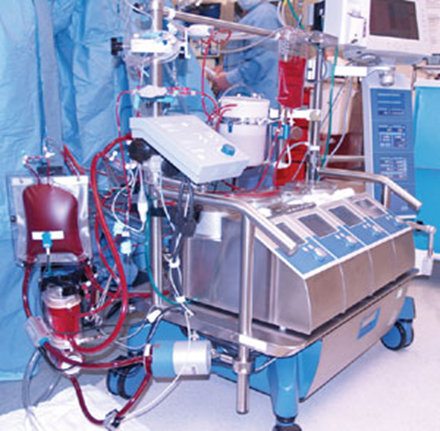
An image of a heart-lung machine that temporarily takes over the function of the heart and lungs during open-heart surgery by maintaining the circulation of blood and oxygen throughout the body.
A new intervention which keeps lungs regularly expanding when using a heart-lung machine during heart valve surgery might protect lung function and exercise capacity in adult patients after the operation, a University of Bristol-led clinical trial has found.
The research, published in the Journal of American Heart Association [JAHA] today [26 Sep], could benefit thousands of similar patients globally undergoing cardiac surgery if adopted by the NHS in the future.
The aim of this National Institute of Health and Care Research (NIHR)-funded randomised controlled trial was to find out if keeping the lungs regularly expanding, known as low frequency ventilation (LFV), during heart-lung machine in patients undergoing heart valve surgery could be linked to better postoperative lung function and exercise ability.
The study also wanted to find out the feasibility and safety of keeping lungs expanding during heart-lung machine, whether it affected surgery and if any specific change in biomarkers of lung injury could be identified and therefore targeted in future studies to develop a lung protection drug.
Current practice involves the lungs being left collapsed when using heart-lung machine during heart surgery, which is already known to trigger lung damage and reduced function after an the operation. These complications are associated with a longer hospital stay and a greater risk of mortality in high-risk cases.
Sixty-three patients with severe mitral or aortic valve disease were randomised to either LFV or usual care with collapsed lungs. The average age of the patients was 66.8 year, 30 per cent were women, and participants were followed up for six to eight weeks after discharge.
The trial found it was feasible and safe to use LFV when using heart-lung machine in patients undergoing heart valve surgery. In addition, it showed preserved lung function and patients walked significantly longer during the six minutes walking test before discharge compared to those treated with usual care. Also, LFV triggered a change to a specific biomarker/mediator (sRAGE) of lung function, which could be targeted in future studies.
Raimondo Ascione, Professor of Cardiac Surgery and Translational Research and Director of TBRC at Bristol Medical School: Translational Health Sciences (THS), NHS Consultant Cardiac Surgeon, Chief Investigator and senior author on the paper, said: "Our randomised clinical phase II trial has found using low frequency ventilation (LFV) during heart-lung machine in the targeted heart valve surgery patients is viable, safe and effective".
"Our next step will be to undertake a larger national phase III trial in a large number of patients with severe heart valve disease. If the future larger trial confirms the results of this study then this treatment could be adopted in the NHS as routine practice and could lead to significant cost savings.
"Also, future mechanistic studies on sRAGE might lead to the development of a new lung protection drug that could be given to all patients undergoing cardiac surgery using a heart-lung machine."
The trial was conducted at the Bristol Heart Institute, sponsored by the University Hospital Bristol and Weston NHS Foundation Trust (UHBW), and supported by the National Institute of Health Research (NIHR) Bristol Biomedical Research Unit (BRC). The trial, data collection and data analysis were managed independently by the Bristol Trials Centre, a UKCRC registered clinical trials unit.
Paper
'Low Frequency Ventilation during cardiopulmonary bypass to protect postoperative lung function in cardiac valvular surgery: the PROTECTION phase II randomised trial' by Raimondo Ascione et al. in Journal of American Heart Association [JAHA].






